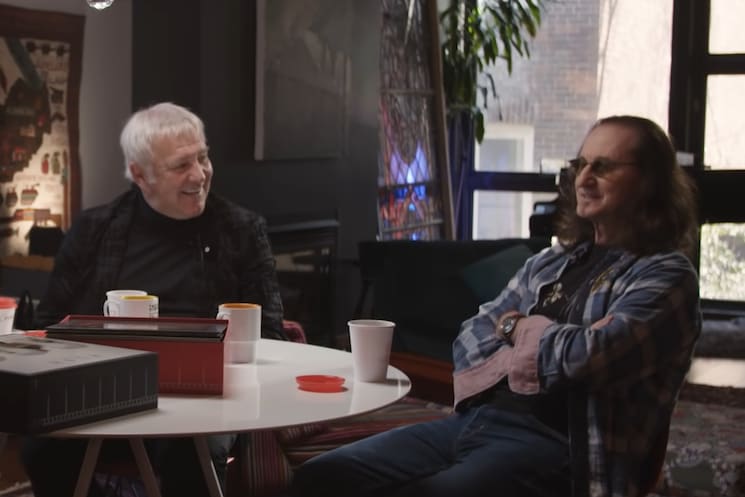In the midst of many new projects from Alex Lifeson and Geddy Lee, the two Rush members recently took the time to sit down in Toronto with fellow Canadian George Stroumboulopoulos for The Strombo Show to discuss the 40th anniversary of Moving Pictures.
During the interview, the surviving bandmates spoke at length about the loss of Neil Peart, legendary Rush drummer and their friend of over four decades, plus what it was like having to keep silent about his illness up until his death, and consequently having to grieve their friend publicly.
"He wanted to keep it in the house," Lee explained [as transcribed by Blabbermouth]. "And we did. And that was hard. I can't tell you it was easy, 'cause it was not easy. And it was ongoing."
Lee continued: "His diagnosis was… He was given 18 months at the most, and it went on three and a half years. And so that was a constant flow of us going to see him, giving him support ... And when you're in that state, it's very hard to function normally, because you can't talk to anybody about it, 'cause no one's supposed to know ... on one hand, it feels dishonest, but on the other hand you're being loyal to your friend. So fuck the dishonesty part. That wins."
Lifeson added that he and Lee felt that the band "had a lot of gas in the tank" after the R40 tour and that he hoped to "squeeze out" 150 more shows prior to Peart's retirement and subsequent cancer diagnosis.
"We were all starting to feel the fatigue," Lifeson conceded, "as you normally would. And had it been a normal tour, we have gone out for probably another month and then taken a month off, or maybe a couple of months off, and then picked it up for another three or four months."
He added: "But it was becoming really difficult for Neil to play at that level, and unless he could play a hundred percent at that level, he really didn't wanna do any more shows, and he didn't wanna be that person that should have taken it."
Lifeson went on to sympathize with his late friend, noting that though the band "ended on a high note," it was "a miracle that [Peart] was even able to play" a sometimes-"three-hour show playing the way he played."
Watch the full interview below.
During the interview, the surviving bandmates spoke at length about the loss of Neil Peart, legendary Rush drummer and their friend of over four decades, plus what it was like having to keep silent about his illness up until his death, and consequently having to grieve their friend publicly.
"He wanted to keep it in the house," Lee explained [as transcribed by Blabbermouth]. "And we did. And that was hard. I can't tell you it was easy, 'cause it was not easy. And it was ongoing."
Lee continued: "His diagnosis was… He was given 18 months at the most, and it went on three and a half years. And so that was a constant flow of us going to see him, giving him support ... And when you're in that state, it's very hard to function normally, because you can't talk to anybody about it, 'cause no one's supposed to know ... on one hand, it feels dishonest, but on the other hand you're being loyal to your friend. So fuck the dishonesty part. That wins."
Lifeson added that he and Lee felt that the band "had a lot of gas in the tank" after the R40 tour and that he hoped to "squeeze out" 150 more shows prior to Peart's retirement and subsequent cancer diagnosis.
"We were all starting to feel the fatigue," Lifeson conceded, "as you normally would. And had it been a normal tour, we have gone out for probably another month and then taken a month off, or maybe a couple of months off, and then picked it up for another three or four months."
He added: "But it was becoming really difficult for Neil to play at that level, and unless he could play a hundred percent at that level, he really didn't wanna do any more shows, and he didn't wanna be that person that should have taken it."
Lifeson went on to sympathize with his late friend, noting that though the band "ended on a high note," it was "a miracle that [Peart] was even able to play" a sometimes-"three-hour show playing the way he played."
Watch the full interview below.




